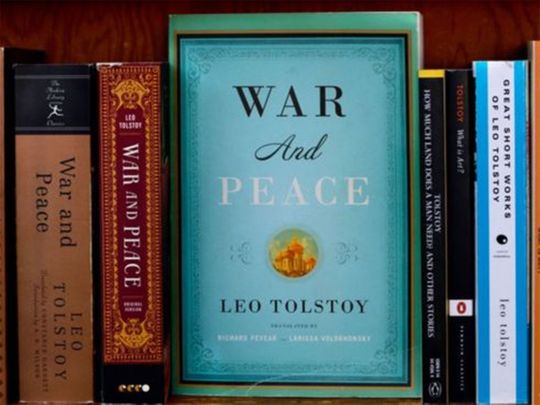
Leo Tolstoy’s 151 year old novel War and Peace is trending on social media India today. Why? A Bombay High Court judge on Wednesday raised quite a stir on Twitter when he asked Bhima Koregaon violence case accused Vernon Gonsalves to explain why he kept “objectionable material” like a copy of “War and Peace” among his collection of books and CDs at home.
India’s Bombay High Court (HC) on Wednesday asked activist Vernon Gonsalves to explain the “objectionable material” found at his home after the Pune police opposed his bail citing “highly incriminating evidence” in the form of “books and CDs with objectionable titles” recovered from his possession.
Twitter users especially book lovers could not believe that Bombay HC Justice Sarang Kotwal referred to Tolstoy’s novel in such a manner. The literary piece that is a bestseller in India is based on Napoleon’s invasion of Russia in 1812. Kotwal said that “such books” and CDs prima facie indicated they contained some material against the state.
“... ‘War and Peace’ is about a war in another country. Why did you (Mr. Gonsalves) keep objectionable material such as books like War and Peace, and CDs at home? You will have to explain this to the court,” said Justice Kotwal.
‘What is so objectionable about Tolstoy’s War and Peace?’, asked tweeps.
Tweeps jumped to question courts statements.
@saliltripathi tweeted: “The judge should leave his Pride and Prejudice aside & try use his Sense and Sensibility,then he’d realise that the matter of reading #WarAndPeace is not about Crime and Punishment, but about Power and Glory,lest his tenure will be a time for Laughter and Forgetting.#Forloveofbooks”
And @ranjona added: “Are judges in India required to read the Constitution of India? Asking for a judge in the Mumbai High Court. #Tolstoy #WarAndPeace #nolimittostupidity”
Twitter users later found out that the objectionable material in question was a different “War and Peace”
Tweep @arti_ghargi posted: “Calm down guys. Turns out the War and Peace in question is not the one written by Leo Tolstoy but the one by Biswajit Roy. The book named: ‘War and Peace in Junglemahal’. Did anyone misquote the court? #WarAndPeace”
Judge was not referring to Tolstoy’s book
The Bombay High Court on Thursday said it knew that Leo Tolstoy’s ‘War and Peace’ was a literary classic and that it didn’t mean to suggest that all the books seized by Pune police in the Elgar Parishad-Koregaon Bhima case were incriminating.
According to an article on NDTV.com Justice Kotwal clarified, “... yesterday, I was reading the whole list from the chargesheet. It was written in such poor handwriting. I know War and Peace. I was making a query on the entire list that police has mentioned (as evidence).”
Yug Chaudhary, counsel for co-accused Sudha Bahrdwaj, then told the court that the War and Peace that the court had referred to on Wednesday was a collection of essays edited by one Biswajit Roy, a Kolkota-based journalist and was titled War and Peace in Junglemahal: People, State and Maoists.
The Elgar Parishad-Bhima Koregaon case
The court was hearing bail pleas of Gonsalves and five others, who were arrested last year for allegedly making provocative speeches on December 31, 2017. According to Indian media reports, the speeches were blamed for allegedly triggering caste violence that left one person dead when Dalits gathered near Pune the next day to celebrate the 200th anniversary of the victory of Mahar scheduled caste soldiers of the British East India Company over Brahmin Peshwas at Bhima-Koregaon.
According to an article on Hindustan Times, the Pune police, which is probing the case, earlier claimed Tolstoy’s book was part of the “highly incriminating evidence” it seized from Gonsalves’s house in Mumbai last year.
Others arrested in the case are activists and academics Shoma Sen, Rona Wilson, Sudha Bharadwaj, Arun Ferreira, and Gautam Navlakha.
Police are probing their alleged Maoist links under the Unlawful Activities (Prevention) Act, for organising a gathering called Elgar Parishad ahead of the event to commemorate the 200th anniversary of the Battle of Bhima Koregaon on January 1, 2018.
Gonsalves’s lawyer, Mihir Desai said “mere possession” of such books and CDs “did not make Gonsalves a terrorist or a member of any banned Maoist group”.








